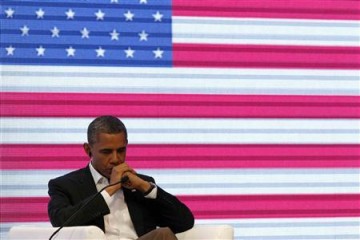Editor’s Note – Obama has a bad couple of weeks, and this trip to South America did not help at all. It seems, our neighbors to the south do not like Mr. Obama that much, despite all his previous cozy trips to see people like Hugo Chavez in the past. Despite the scandal blowing up before he arrived, our declining influence in the region took a severe hit.
Latin America rebels against Obama over Cuba
By Andrew Cawthorne and Brian Ellsworth
CARTAGENA, Colombia
(Reuters) – Unprecedented Latin American opposition to U.S. sanctions on Cuba left President Barack Obama isolated at a summit on Sunday and illustrated Washington’s declining influence in a region being aggressively courted by China.
Unlike the rock-star status he enjoyed at the 2009 Summit of the Americas after taking office, Obama has had a bruising time at the two-day meeting in Colombia of some 30 heads of state.
Sixteen U.S. security personnel were caught in an embarrassing prostitution scandal before Obama arrived, Brazil and others have bashed him over U.S. monetary policy, and he has been on the defensive over Cuba and calls to legalize drugs.
Due to the hostile U.S. and Canadian line on communist-run Cuba, the heads of state failed to produce a final declaration as the summit fizzled out on Sunday afternoon.
“There was no declaration because there was no consensus,” said Colombian President Juan Manuel Santos. He bristled at suggestions the summit had been a failure, however, saying the exchange of different views was a sign of democratic health.
For the first time, conservative-led U.S. allies like Mexico and Colombia are throwing their weight behind the traditional demand of leftist governments that Cuba be invited to the next Summit of the Americas.
Cuba was kicked out of the Organization of American States (OAS) a few years after Fidel Castro’s 1959 revolution, and has been excluded from its summits due mainly to U.S. opposition.
But Latin American leaders are increasingly militant in opposing to the 50-year-old U.S. trade embargo on the island.
“The isolation, the embargo, the indifference, looking the other way, have been ineffective,” Santos said. “I hope Cuba is at the next summit in three years.”
A major U.S. ally in the region who has relied on Washington for financial and military help to fight guerrillas and drug traffickers, Santos has become vocal over Cuba’s inclusion even though he also advocates for democratic reform by Havana.
CLINTON PARTIES AT ‘CAFE HAVANA’
In an ironic twist to the debate, U.S. Secretary of State Hillary Clinton went dancing in the early hours of Sunday at a Cartagena bar called “Cafe Havana” where Cuban music is played.
Argentine President Cristina Fernandez, who has insisted without success that Washington recognize its claim to the Falkland Islands controlled by Britain, was one of several presidents who left the summit well before its official closure.
The leftist ALBA bloc of nations – including Venezuela, Ecuador, Bolivia, Nicaragua and some Caribbean nations – said they will not attend future summits without Cuba’s presence.
“It’s not a favor anyone would be doing to Cuba. It’s a right they’ve had taken away from them,” Nicaraguan President Daniel Ortega said from Managua.
Though there were widespread hopes for a rapprochement with Cuba under Obama when he took office, Washington has done little beyond ease some travel restrictions. It insists Cuba must first make changes, including the release of political prisoners.
Obama has not spoken publicly of Cuba at the summit, though he did complain that Cold War-era issues, some dating from before his birth, were hindering regional integration.
“Sometimes I feel as if in some of these discussions, or at least the press reports, we’re caught in a time warp, going back to the 1950s and gunboat diplomacy and Yankees and the Cold War, and this and that and the other,” the 50-year-old Obama said.
“That’s not the world we live in today.”
The prostitution saga was a big embarrassment for Obama and blow to the prestige of his Secret Service. It was the talk of the town in the historic Caribbean coastal city of Cartagena.
Eleven Secret Service agents were sent home and five military servicemen grounded after trying to take prostitutes back to their hotel the day before Obama arrived.
HOTEL FRACAS
A local policeman told Reuters the affair came to a head when hotel staff tried to register a prostitute at the front desk, but agents refused and waved their ID cards. An investigation is underway in the United States.
“Someone who’s charged with looking after the security of the most important president in the world cannot commit the mistake of getting mixed up with a prostitute,” said Cartagena tourist guide Rodolfo Galvis, 60.
“This has damaged the image of the Secret Service, not Colombia.”
The divisive end to the summit added to strain on the U.S.-dominated system of hemispheric diplomacy that was built around the OAS but is struggling to adapt to changes in the region.
“I’m not sure the next summit will even be possible,” said Carlos Gaviria, a Colombian politician and former presidential candidate.
Perceived U.S. neglect of Latin America has allowed China to move strongly into the region and become the leading trade partner of Brazil and various other nations.
Regional economic powerhouse Brazil has led criticism at the summit of U.S. and other rich nations’ expansionist monetary policy that is sending a flood of funds into developing nations, forcing up local currencies and hurting competitiveness.
She called it a “monetary tsunami” that Latin American nations had the right to defend themselves from.
Cheering the mood a bit, U.S. Trade Representative Ron Kirk announced that a U.S.-Colombia free trade agreement will come into force in the middle of May.
With a presidential election looming, Obama had portrayed his visit to the summit as a way to generate jobs at home by boosting trade with Latin America.
(Additional reporting by Mario Naranjo, Luis Jaime Acosta, Arshad Mohammed, Helen Murphy and Pablo Garibian in Cartagena, Ivan Castro in Managua; Editing by Daniel Wallis and Kieran Murray)


